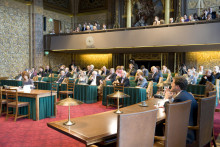Yesterday, senators declared three draft bills ‘controversial’ because the government has collapsed. Two pieces of proposed legislation touch on constitutional issues. Language and Accessibility is the only ‘ordinary’ law that has to pay the price.
The government wants to require English-language educational programmes in the Netherlands to defend the added value of making English their lingua franca. Furthermore, these programmes will have to advance students' Dutch communication skills as well.
Master’s
The draft law is a response to the growing criticism in the country of the internationalising of higher education. Universities in particular are continually adding English-language programmes, mostly at the Master's stage.
Critics allege that institutions only want to recruit foreign students to rake in extra government funding, if necessary at the cost of the quality of education: all that English is corrupting students' Dutch language skills.
Others think that English-language higher education prepares students for the global jobs market of the future. Furthermore, research has long been highly internationalised.
Squeezed out
The ‘accessibility’ in the title of the bill is a reference to a different issue. There are concerns that Dutch students could be squeezed out of study programmes with a limited number of places (numerus fixus) by foreign students. Something has to be done about this, too.
The solution: apply the numerus fixus to the foreign language stream. Dutch students can then always find a place in the Dutch variant, while you can restrict the influx of foreign students when necessary.
Senators were considerably critical of the draft law, as their written questions reveal. It's going to lead to a mountain of bureaucratic paperwork, one predicted. It's going to be a paper tiger, another said.
On hold
The Senate apparently didn't want to wait for Minister van Engelshoven's defence. They put the debate on the proposed legislation on hold. After the elections they will look at it again.
Presumably the Minister had been hoping for a different outcome. She took the liberty of sending a scheme to the Senate and House of Representatives in which she expanded on the proposed legislation, as if everything was going as planned.
The current draft bill was, moreover, already the result of a ‘balancing act’, the Minister said at the end of 2019, because she had been forced to weigh ‘the quality and accessibility of higher education against the added value of internationalisation and the interests of the Dutch language’.
But she also had to keep an eye on the political relationships within the government coalition. The balance of power will likely change after the elections, but how? One thing is certain: it's going to be an exciting time for language policy in higher education.






